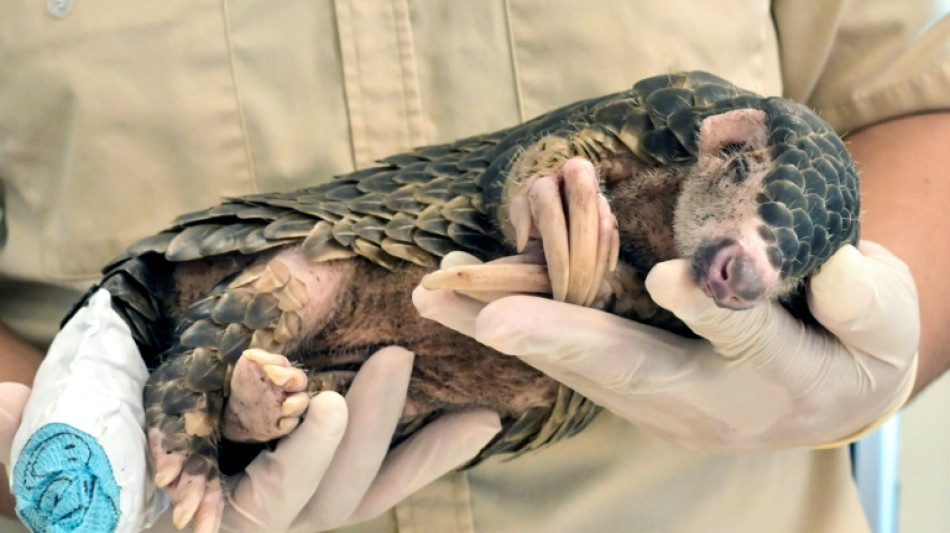
SCS
0.0200

In most of its habitats, the heavily trafficked pangolin's biggest threat comes from humans. But in Taiwan, the scaly mammals brave a different danger: a surging feral dog population.
Veterinarian Tseng Shao-tung, 28, has seen firsthand what a dog can do to the gentle creatures during his shifts at a hospital in Hsinchu.
Last month he worked to save the life of a male juvenile pangolin who had been lying in the wild for days with half of its tail chewed off.
"It has a big open wound on its tail and its body tissue has decayed," Tseng said as he carefully turned the sedated pangolin to disinfect the gaping injury.
It was the fifth pangolin Tseng and his fellow veterinarians had saved this year, all from suspected dog attacks.
Chief veterinarian Chen Yi-ru said she had noticed a steady increase of pangolins with trauma injuries in the last five years -- most of them with severed tails.
Pangolins are covered in hard, overlapping body scales and curl up into a ball when attacked. The tail is the animal's most vulnerable part.
"That's why when attacked, the tail is usually the first to be bitten," Chen explained.
Wildlife researchers and officials said dog attacks, which account for more than half of all injuries since 2018, have become "the main threat to pangolins in Taiwan" in a report released last year.
- Most trafficked mammal -
Pangolins are described by conservationists as the world's most trafficked mammal, with traditional Chinese medicine being the main driver.
Although their scales are made of keratin -- the substance that makes up our fingernails and hair -- there is huge demand for them among Chinese consumers because of the unproven belief that they help lactation in breastfeeding mothers.
That demand has decimated pangolin populations across Asia and Africa despite a global ban and funded a lucrative international black market trade.
All eight species of pangolins on both continents are listed as endangered or critically endangered.
Taiwan has been a comparative conservation success story, transforming itself from a place where pangolins went from near-extinct to protected and thriving.
Chan Fang-tse, veterinarian and researcher at the official Taiwan Endemic Species Research Institute, said the 1950s to 1970s saw massive hunting.
"Sixty thousand pangolins in Taiwan were killed for their scales and hides during that period," he told AFP.
A 1989 wildlife protection law ended the industry, while rising conservation awareness led the public to start embracing their scaly neighbours as something to be cherished, rather than a commodity.
The population of the Formosan or Taiwanese pangolin, a subspecies of the Chinese pangolin, has since bounced back with researchers estimating that there are now between 10,000 to 15,000 in the wild.
But the island's growing feral dog population -- itself a consequence of a 2017 government policy not to cull stray animals -- is hitting pangolins hard, Chan warned.
"Pangolins are most affected because they have a big overlap of roaming area and pangolins don't move as fast as other animals," Chan said.
- Picky eaters -
Pangolins are also vulnerable because of how few offspring they have.
The solitary Formosan pangolins mate once a year and only produce one offspring after 150 days of pregnancy. Captivity breeding programmes have had little success.
"It may be more difficult to breed pangolins than pandas," Chan said.
The rise in injured pangolins has created another challenge for animal doctors: finding enough ants and termites to feed the picky eaters who often reject substitute mixtures of larvae.
Piling into a truck with three other vets, Tseng headed to a tree to retrieve an ant nest he had recently spotted.
"We have to be constantly on the lookout and go search for ants nests every couple of days now because we have more pangolins to feed," Tseng said.
A pangolin can eat an ant nest the size of a football each day.
The government has also called for residents to report nest locations to help feed the pangolins until they can be released back into the wild.
But the injured pangolin in Tseng's care will likely have to be sent to a zoo or government facility for adoption after it recovers.
"It will have difficulty climbing up trees and won't be able to roll itself into a ball shape," Tseng said.
"It has lost the ability to protect itself in the wild."
K.Dudek--TPP